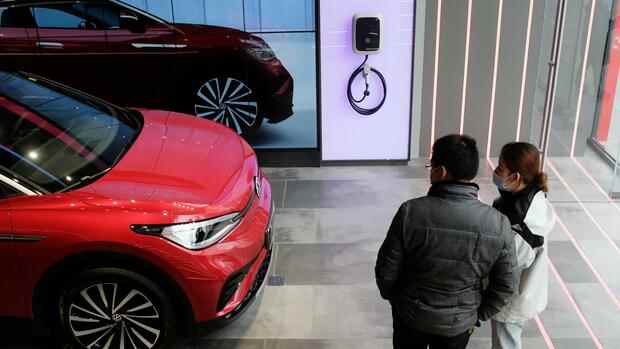The Chinese electric car manufacturers have so far grown more dynamically than the Germans.
(Photo: Reuters)
new York Global sales of fully electric vehicles more than doubled in the first quarter of 2022 compared to the same period last year to 1.4 million vehicles. Sales of so-called plug-in and full hybrids, i.e. cars with an additional combustion engine, have risen less sharply. This is shown by a new study by the auditing and consulting company PwC, which was previously available to the Handelsblatt.
Much of the sales increase can be attributed to China, which was responsible for two-thirds of all fully electric vehicles sold worldwide. According to the study, 1.3 million electric cars – including hybrid vehicles – were sold in the People’s Republic in the first quarter, after 0.5 million in the same period last year. Their market share in new sales was 20 percent. According to the analysts, the reduction in corresponding subsidies did not slow down the development either.
In the USA, on the other hand, around 400,000 electric cars were sold, after around 280,000 in the same period. Their market share was 12 percent. “After a slow start, the market for electric vehicles in the USA is now beginning to flourish,” the authors conclude. “An even stronger growth was only prevented by ongoing delivery problems.” The stricter consumption standards introduced by the government under US President Joe Biden and increased fines for non-compliance for car manufacturers further strengthened the prospects.
The new figures for German automakers are encouraging. These were still left behind when it came to electric car sales in 2021 in China and the USA. Sales of fully electric vehicles made in Germany increased by 92 percent in the first quarter – slightly weaker than the overall market, but significantly stronger than last year. In China, thanks to new models, German manufacturers were able to record an increase of 277 percent compared to the same quarter of the previous year. The market share in the People’s Republic was at least four percent.
Top jobs of the day
Find the best jobs now and
be notified by email.
The supply chains remain crucial
The PwC experts also analyzed ten Western European markets, including Germany. In these countries, 1.0 million electric cars were sold in the first quarter, after around 890,000 in the same period last year. Their market share was 46 percent. Norway is the leader: electric cars accounted for a whopping 93 percent of sales here. In Germany, their share was 43 percent.
As shown by the lower market share, China and the USA still have some catching up to do when it comes to the new drives. At the same time, both countries are among the largest car markets. Their importance for the automotive industry is therefore likely to increase further in the coming years.
What’s next in 2022? According to PwC expert Jörn Neuhausen, the decisive factor is whether the car manufacturers will be able to secure the necessary supply chains in view of the war in Ukraine. “While the shortage of chips initially slowed down growth, the economic sanctions against Russia are now leading to extreme price increases and supply bottlenecks for important metals,” he explains. These include lithium, nickel and cobalt. As late as 2021, Russia was the world’s third largest supplier of nickel. Neuhausen therefore expects new partnerships between car manufacturers and raw material suppliers.
Vehicles with hybrid drives are no longer a topic of the future. “The European manufacturers are now focusing on the all-electric future technology,” write the PwC experts. So-called plug-in hybrids are hardly ever needed as a bridging technology. Sales in the European markets examined fell by eight percent.
More: The struggle for the battery – More and more car manufacturers are stocking up on battery metals
